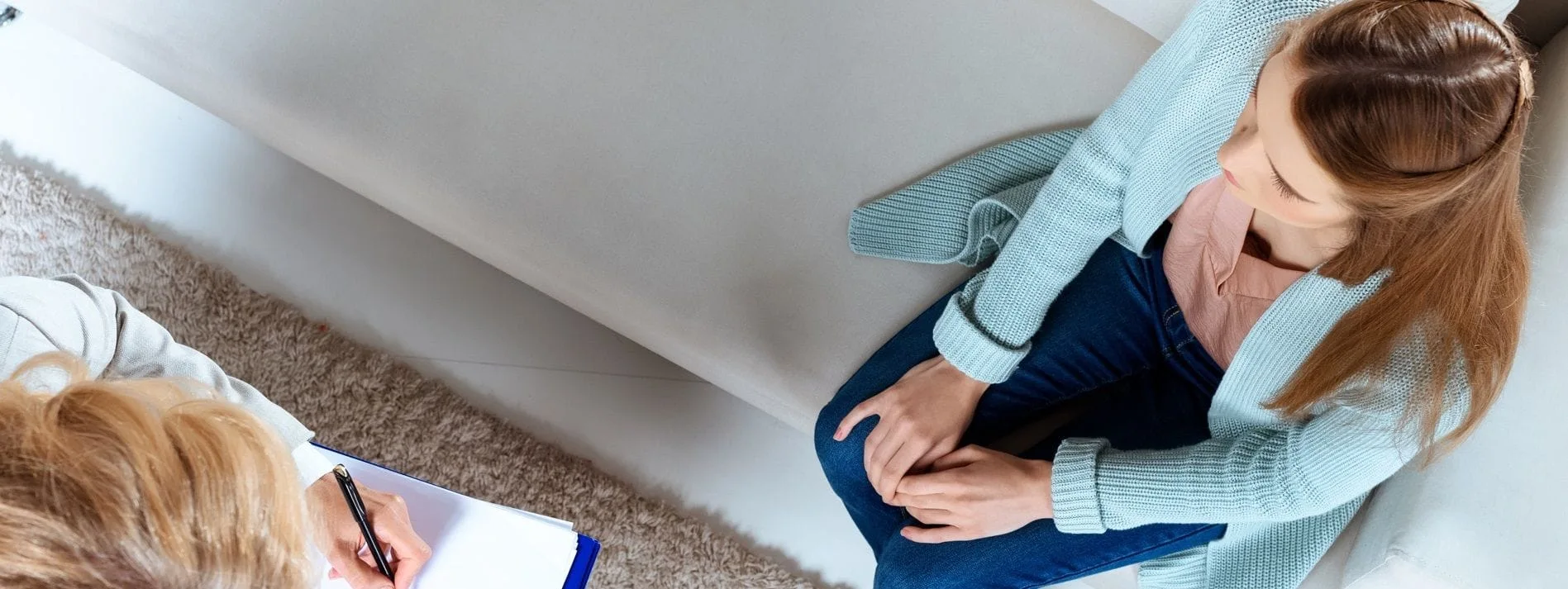
The past frames our beliefs and value systems and shapes our adult lives. Consequently, some of my approaches will help you understand repetitious patterns in your life, leading you to make connections between earlier experiences and the way they’ve shaped your adulthood. This awareness helps you to catch yourself before you react to current situations with outmoded responses from your past, as you identify the emotional forces that are holding you back.
First steps…please understand, there is a difference between being courageous and being strong. Being strong contains and pushes down our issues and challenges. Then, one day, we wake up only to find that containment has actually aggravated the situation. Whereas, being courageous means taking that first step knowing we don’t have to go it alone. But, only you have the power to take that first step toward change.
My individual specialties focus on anxiety and stress management, internal dialogues, bereavement, grief and loss, solo couples counseling and dating.
Why am I so specific? Consider each one taken alone. Now, consider them collectively. What you have is a unique combination of factors that interconnect – each one affecting the other.
One of the wonderful things about counseling is that we don’t know what we don’t know at the time, but we can learn. After all…
If nothing changes, nothing changes.
ANXIETY and STRESS MANAGEMENT
Anxiety and stress not only take a toll on our emotional and cognitive health, they also create havoc on our physical health, namely blood pressure, heart health, sleep patterns and aging. Have you noticed the part of your body that holds your stress? Is it your neck, your shoulders, your stomach, your entire body? Anxiety and stress increase our heart rate and blood pressure and affect sleep while releasing stress hormones into our system.
There are two kinds of stress, chronic and acute. For example, chronic stress is the kind that comes from a toxic relationship or a bad job. While acute stress may take many forms. One example is the mental stress related to various forms of learning.
Chronic stress leads to prolonged elevation of the hormone cortisol and epinephrine, resulting in some serious physiological consequences. Heart rate and blood pressure elevate, digestion slows down, blood sugar gets released, the immune system becomes suppressed and inflammation and gut permeability are increased. These are only some of the factors affecting our physical health. What about our emotional and cognitive health – our memory, focus, concentration, decision making, empathy, compassion, patience? The list goes on.
As we work together to decrease your anxiety and stress, you’ll learn how to:
- Distinguish between anxiety and actual facts
- Identify triggers related to the past as well as present day triggers
- Decrease your anxiety about anxiety
- Learn techniques that will decrease your overall anxiety
- Change the automatic thoughts that create your anxiety
- Decrease rumination
- Use relaxation, mindfulness, breathing and visualization techniques
- Distinguish between productive and unproductive worry
Please check out my Recommended Reading listed under Resources for additional information. An excellent book linking food and stress is Lugavere’s Genius Foods (also under Resources). It’s current, short, easy to read and understand and speaks to the interconnectedness of it all. In addition, it contains some interesting information regarding Alzheimer’s, sleep, sugar, gut and gut bacteria, hormones and much more.
INTERNAL DIALOGUES
Do any of these statements sound familiar?
“I have to do everything perfectly.” If I don’t, I just feel so stupid.”
“I’m always comparing myself to others.”
“Big boys don’t cry.”
“When I walk into a room, everybody looks at me. I know they’re really judging me.”
Do You…
Feel stuck? Have thoughts that keep you up at night?
Use food or cutting edge humor to hide unresolved issues?
Overdo for others and forget about caring for yourself?
Work obsessively till everything looks perfect?
We are our thoughts and, as such, they tend to create our reality. A situation occurs at home or at work and you keep reliving the scenario or you keep saying to yourself “I should have said this or done that”. Have you ever wondered what you could do to change these types of thoughts? Or, do you believe “that’s just how I am”. It’s hopeless. Perhaps, these ruminating thoughts even keep you awake at night. Maybe it’s something you’ve been living with for years or life’s stresses are catching up with you and you’re feeling stuck, guilty, judged, stressed or undeserving.
The past frames our beliefs and value systems and shapes our adult lives. Repetitious thought patterns develop; becoming so automatic as to be unrecognizable. After all, it’s just the way we are. Right? Wrong.
We begin our work by identifying current thought narratives and triggers, understanding the connections between earlier life experiences and present outmoded responses from the past; thereby, identifying the emotional forces that hold you back.
While we can’t change or relive our childhood or thoughts formed from the past, we can change how we respond to it. My primary therapeutic technique for changing negative thought patterns is cognitive behavioral therapy (CBT) as we work on overriding negative neural pathways and form newer, healthier positive ones. You’ll understand and recognize cognitive distortions. And, as we work together using CBT, you’ll learn how to work with an actual structured process to go about making those changes.
BEREAVEMENT, GRIEF AND LOSS
First, I want to say that without realizing it, grief may actually be the issue underlying our relationship conflicts, our anxiety and stress, our dating challenges. Grief can relate to a number of physical and emotional challenges. It represents a disconnect from a state of health and well-being.
Life losses are the hardest experiences we have to face. Death of a loved one. Loss of a pet. Loss of a relationship, a friend, a job, moving, a home, a dream, security, divorce, infidelity, physical health, childhood emotional neglect. Many other significant changes in one’s life can involve loss and therefore grief. Everyone experiences loss and grief at some point in their lives. Grief is the realization that life can no longer be lived in the way we expected. We may grieve our loved one, our past history, our hopes and dreams for our future.
Grief is not linear; it’s not a straight line. Mourning is a process and while we may not “get over” our loss, we can go through it and arrive out the other side, learning to incorporate it into the entirety of our life.
Often, the words “stages” or “phases” are used to describe our loss. Each of these words implies a certain passivity to it. I prefer the word “tasks” and use the approach called Tasks of Mourning to process loss.
Did you know that we grieve the same way that we live? Are you primarily an introvert or an extrovert? Are you a thinker or a feeler? Do you need quiet and privacy or people and activity to recharge? Do you focus on tasks and the work to be accomplished or do you focus more on people and their interactions?
Grief is a normal and natural response to loss. If you’ve experienced a significant loss that’s impacting your live, please give serious consideration to asking me for help through this tough time.
My website can’t replace an informative one-on-one conversation. So, I welcome any questions you may have. I can be reached at 470-461-7211 or at [email protected]
SOLO COUPLES COUNSELING
Relationship counseling isn’t just for couples. If you’re currently single or an individual in a relationship, you can still benefit from counseling. Yes, but…
Why should I do all the work!?
Fair question. Going it alone provides you with an option and an opportunity. Right now you and your partner may simply be in a “holding pattern”, each one waiting for the other to change. You may be at your wits end while your partner has little motivation for change.
At this point in your relationship aren’t you just tired of the struggle? In fact, you may even be contemplating divorce. Please know that going it alone doesn’t take your partner off the hook. And, yes, change isn’t easy. Instead of focusing on the above question ask yourself this question instead?
Aren’t I entitled to a healthy and vital relationship?
Take charge. Let me help you become that powerful person who does take charge. And, if you feel that your relationship is too far gone, this may be the time to give it one last shot. As your sessions progress, your partner may even choose to participate with you later on.
Working together you’ll learn how to:
- Explore strengths, identify triggers
- Understand existing expectations
- Learn to recognize old patterns in thoughts and behaviors
- Foster and Improve communications
- Have calm couples discussions even when the subject is uncomfortable.
- Work through your anxiety when tough topics arise
- Get through a crisis such as infidelity, grief and loss
- Reestablish emotional and physical intimacy
Couples don’t grow hand in hand and you can’t force your partner to grow with you. However, you can start growing on your own and, consequently, once you start the work, your changes will, in time, begin to influence your partner and your relationship. We can change how people respond to us.
Acting alone you can also create far-reaching positive change. It does mean, however, that you will have to let go of your need for fairness (why do I have to be the one to do this?) and the expectation that partners should work together at the same time. You can be the fore-runner for change.
DATING
Are you tired of relationships that go nowhere?
Do you wonder if you’re ever going to find a loving relationship? Counseling can help you overcome past hurts, understand patterns and blocks to intimacy and help you form a trusting and meaningful long term relationship.
Counseling can help you make some simple and practical changes in order to have a more successful and enjoyable dating life. We’ll discuss and define more clearly the kind of relationship that you want and the strategies to obtain it. We’ll identify any insecurities or old patterns that are holding you back. You’ll learn how to manage your expectations, emotions, urges and needs without sounding needy and how to set healthy boundaries while retaining your sense of self.
Now, congratulate yourself for understanding that you have a normal and healthy desire to be in a relationship. You’re now about to give yourself the support you need to make that happen.
As your counselor, your cheerleader, your coach, I provide a safe, respectful, peaceful, nonjudgmental environment for our work together.
Since my website offers only a brief glimpse into my counseling practice and can’t replace an informative one-on-one conversation…
I offer a complimentary phone consultation to answer any questions and discuss your situation and concerns. Also, I integrate spiritual/faith based counseling upon request. Telecounseling in the form of phone and HIPPA compliant video available as needed. You may reach me at 470-461-7211 or at [email protected]
Your time is precious. Many thanks for sharing it with me. Please don’t hesitate to come back often, make use of my resources and read the relevant information in my upcoming Blog posts. The information is here to serve you.
I hope to see you soon.
With the deepest respect for your journey.
Warmly,
Linda
